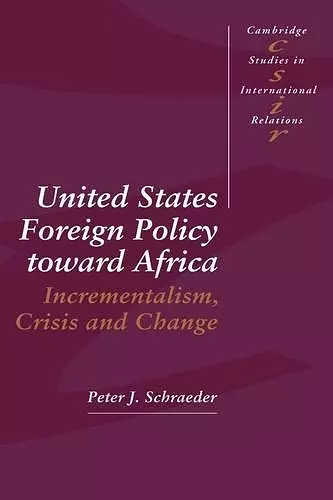United States Foreign Policy toward Africa
Incrementalism, Crisis and Change
Format:Paperback
Publisher:Cambridge University Press
Published:1st Jan '94
Currently unavailable, and unfortunately no date known when it will be back
This paperback is available in another edition too:
- Hardback£109.00(9780521444392)

In this book Peter Schraeder offers the first comprehensive theoretical analysis of US foreign policy toward Africa in the postwar era. He argues that though we often assume that US policymakers 'speak with one voice', Washington's foreign policy is, however, derived from numerous centres of power which each have the ability to pull policy in different directions. The book describes the evolution of policy at three levels: Presidents and their close advisors; the bureaucracies of the executive branch; and Congress and African affairs interest groups. Most importantly, the evidence presented demonstrates that the nature of events in Africa has itself affected the operation of the US policymaking process, and the substance of US policy. Drawing on over 100 interviews, and detailed case studies in Zaire, Ethiopia-Somalia and South Africa, this book provides a unique analysis of the historical evolution of US foreign policy towards Africa from the 1940s to the 1990s.
"The audience for whom the book was written...should find the volume generally useful. Each group will find its extensive sources very helpful...and practitioners in the foreign policy field should find important clarifications and insights from the described role of the national bureaucracies. ... The book is well written and is accessible to bright undergraduate students." Winston E. Langley, University of Massachusetts, Boston (Book Review-- source?)
"The detail of the case studies provides a fascinating glimpse into American foreign policy toward Africa since World War II, and the theoretical argument makes a contribution to explaining when the president matters, when bureaucrats matter, and when Congress matters. The overall approach of the book is highly readable and engaging and its historical and conceptual content make it well-suited for upper-divisional undergraduates and graduate seminars." Presidential Studies Quarterly
"Peter Schraeder's new analusis of American foreign policy toward Africa is a welcome addition to the literaure on American foreign relations with countires south of the Sahara and to the more general study of American foreign policy. The book's primary appeal is its extensive investigation of how bureaucratic politics affect U.S. policy toward Africa and under what conditions policy is not made as business as usual." Political Science Quarterly
"This first-rate book is aimed at both an academic audience and African readers trying to make sense of American diplomacy....the accounts are well presented and effectively illustrate the patterns and processes at the core of the analysis....An excellent text for college courses." Gail Gerhart, Foreign Affairs
"...a welcome addition to the literature....the book is based on solid research (including almost 100 interviews), and the case studies are well written and informative. After reading this book, one is left with an understanding of how negatively the Cold War affected Africa, and how the superpowers used Africa as an arena for settling global conflicts....Schraeder makes an important contribution by integrating the analysis of African international relations into a broader social scientific framework....The book is also a good place to start for readers who seek an overview of U.S. relations with Africa. Both specialists and generalists will find this a useful study." David N. Gibbs, Journal of Politics
ISBN: 9780521466776
Dimensions: 228mm x 153mm x 23mm
Weight: 545g
376 pages